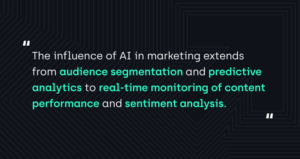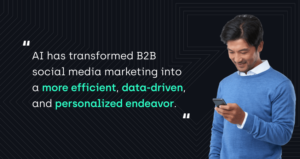Leading B2B companies are always on the hunt for new and creative ways to maintain a competitive edge, and the disruptive impact of AI has brought about a new era of data-driven decision-making.
The influence of AI in marketing extends from audience segmentation and predictive analytics to real-time monitoring of content performance and sentiment analysis. It has become the driving force behind a transformative shift in how businesses engage with their customers and respond to the ever-evolving dynamics of the market.

AI-driven chatbots and virtual assistants are already elevating customer service with the automation of routine tasks and improved response times. While these practices are reshaping the landscape of B2B marketing, AI is also making significant inroads into how organizations approach social media marketing.
Businesses have the opportunity to amplify the influence of their social media strategy with AI by more effectively engaging with their target audience, enhancing brand visibility, and driving higher conversion rates. Discover the ten ways AI can reshape your social media marketing outcomes:
1. Data-Driven Decision Making
AI empowers marketers to get more out of their social media engagements, extracting valuable insights like audience preferences, engagement trends, and emerging market shifts. These insights, in turn, inform the development of content, posting schedules, and audience targeting, optimizing social media strategies for peak performance.
In regard to audience segmentation, AI helps by grouping individuals into distinct segments based on demographic data, behavior, and interests. For instance, it can identify groups interested in technology products and others focused on healthcare services. AI leverages predictive analytics to forecast future trends by scrutinizing historical data, aiding in the anticipation of upcoming product or service demands. It provides content recommendations, directing marketers to create content that resonates best with their social media audience.
AI also helps marketing teams by continually monitoring content engagement in real-time, detecting which posts attract the most likes, shares, or comments and subsequently suggesting strategic adjustments. AI’s sentiment analysis capabilities analyze social media discussions to gauge public sentiment for a brand or industry, discerning—for example—whether a product launch is fostering a positive or negative sentiment among customers. In e-commerce, AI’s recommendation engines shine by providing personalized product suggestions based on browsing and purchase history, thereby promoting cross-selling and upselling strategies.
2. Predictive Analytics
One of the most significant advantages of AI in B2B social media marketing lies in its predictive analytics capabilities. AI algorithms can predict future trends and user behaviors by analyzing historical data. This invaluable information enables marketers to anticipate market shifts and adjust their strategies proactively, keeping them ahead of the curve.
These insights empower marketers to craft highly tailored social content, pinpoint optimal posting times, and refine audience targeting using historical data. This honed content strategy not only enhances engagement and visibility but also optimizes budget allocation for maximum ROI. AI’s predictive analytics also assume a critical role in crisis management and risk mitigation. It continuously monitors online sentiment and historical data, promptly alerting marketers to potential issues that could harm brand reputation, and also fosters swift responses to minimize negative publicity.
3. Personalized Content
AI-powered algorithms gain deep insights into individual user preferences by analyzing past interactions and behaviors on social media. This understanding empowers AI to curate and suggest content, products, or services that are likely to strike a chord with every user. Consequently, social media users encounter content that aligns with their specific interests and needs, leading to enhanced user engagement and the cultivation of a more robust, personalized connection between the brand and its audience.
This personalized approach also streamlines the delivery of targeted advertisements, effectively boosting conversion rates and the overall efficiency of marketing campaigns. For example, if a user consistently engages with cloud migration content on social media, AI can ensure they receive ads and recommendations related to cloud migration services, cloud infrastructure providers, or tools for seamless data transfer. This high level of personalization increases the likelihood of transforming a casual social media user into an engaged customer, thereby making a substantial contribution to the brand’s success. This degree of personalization increases the chances of converting a casual social media user into an engaged customer, contributing to the brand’s overall success in the competitive landscape of B2B social media marketing.
4. Chatbots and Virtual Assistants
AI-driven chatbots and virtual assistants play a central role in the evolution of B2B social media marketing. These intelligent, automated entities operate as round-the-clock customer support, efficiently handling common queries and guiding users through the sales funnel. With AI at the helm, businesses can enhance their customer service offerings in various ways.
Moreover, AI-driven chatbots efficiently manage a significant volume of routine inquiries, freeing up teams to concentrate on more intricate and strategic assignments, such as devising innovative marketing campaigns or addressing unique customer needs. This integration of AI streamlines social media communication and empowers businesses to allocate their resources more effectively, enhancing their overall competitiveness in the digital landscape.
5. Content Creation and Curation
While it may not entirely replace human creativity, AI can be a powerful ally in content generation, particularly for data-driven reports and updates. By analyzing vast datasets, AI can automatically generate insights, infographics, and even draft articles, saving marketers significant time and effort. This dynamic content generation ensures a steady stream of valuable, data-backed content and allows marketers to focus on refining and personalizing the generated material to better suit their brand’s voice and messaging.
AI-driven content curation plays a large role in keeping social media feeds fresh and relevant. AI can efficiently identify and recommend articles, posts, and news in a specific industry, ensuring that the content remains up-to-date and valuable to the right audience. By consistently surfacing pertinent content, AI eliminates the need for manual research, allowing marketers to curate their feeds with ease and precision. This combination of AI-generated and curated content enriches the social media presence of B2B marketers, enhancing audience engagement and the overall effectiveness of their digital marketing strategies.
6. Social Listening
AI revolutionizes the way businesses monitor their online presence. Social listening tools powered by AI can continuously track conversations and sentiment regarding a business’s brand, industry, and competitors across various social media platforms and digital spaces. This real-time feedback provides a wealth of insights, allowing businesses to adapt their marketing strategies on the fly, respond to customer feedback with speed and precision, and stay well-informed about emerging trends or potential issues before they escalate. Thanks to AI, B2B marketers can maintain a proactive approach to social listening, ensuring they remain agile and responsive.
7. Ad Targeting and Optimization
By analyzing user data, AI can segment an audience into highly specific groups, ensuring that the ads reach the right people. This targeted approach enhances the likelihood of conversion and engagement, as the ads align with individual preferences and needs. Additionally, AI continuously refines ad campaigns by dynamically adjusting budgets, bidding strategies, and ad creatives based on real-time performance data. This iterative approach fine-tunes a marketer’s advertising efforts for maximum return on investment, a level of optimization that would be nearly unattainable through manual management at the same scale. In essence, AI empowers B2B marketers to optimize their advertising budgets and achieve exceptional results in the fiercely competitive landscape of social media marketing.
8. Competitive Analysis
AI tools can provide marketers with a comprehensive understanding of their competitors’ content, engagement, and audience dynamics by delving deep into their social media strategies. By harnessing this wealth of data, marketers gain the ability to identify gaps and untapped opportunities in the market. With the insights gathered, businesses can revise their strategy to outperform the competition. This data-driven approach ensures that a marketer’s efforts are well-informed and strategically positioned to take out the competition. With AI’s competitive analysis, marketers can stay ahead and constantly adapt to market shifts or evolving consumer preferences.
9. Performance Measurement
By leveraging AI’s capabilities, B2B marketers can obtain in-depth insights into their social media campaign’s performance. AI can track and analyze key metrics such as engagement rates, conversion rates, and return on investment (ROI). This data empowers businesses to make data-driven decisions for better results. AI also provides comprehensive insights that go beyond human capabilities. This enables marketers to pinpoint what’s working and what’s not with unmatched precision, ensuring that they can continuously optimize their social media strategy to align with their business objectives and achieve superior results.
10. Automation and Scheduling
Leveraging historical data, AI can determine the optimal times to post for maximum audience engagement. This data-driven approach ensures that the right content reaches the right audience at the right moment. Furthermore, AI can automatically publish content across various social media platforms, allowing marketers to maintain a consistent online presence without the need for constant manual oversight. This not only saves time but also ensures that their social media channels remain active and engaging even during non-business hours or busy periods. With AI’s automation and scheduling capabilities, businesses can streamline their social media management, enhance their brand’s visibility, and create a more efficient and responsive digital marketing strategy.
Putting AI to Work in Social Media Marketing
AI has transformed B2B social media marketing into a more efficient, data-driven, and personalized endeavor. By leveraging the power of AI in a social media strategy, marketers can streamline processes, engage their audience more effectively, and ultimately drive business growth. As AI technology continues to advance, businesses that embrace these innovations will be well-positioned to succeed in the ever-evolving world of social media marketing.
When the time is right for you and your business, Yeager is ready to help you explore how AI can help boost your social media results.


